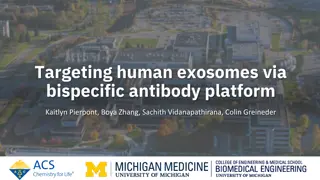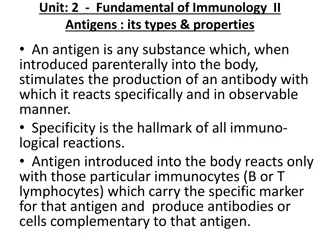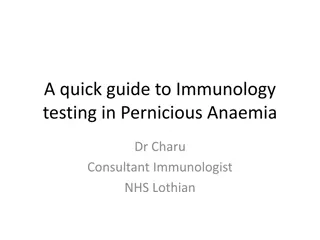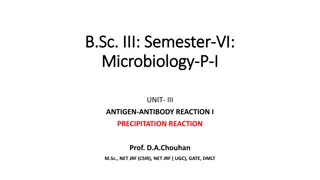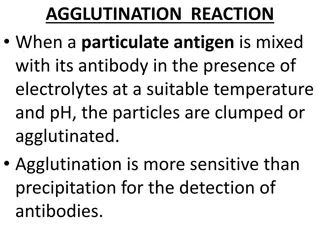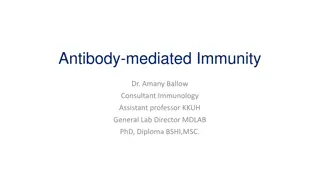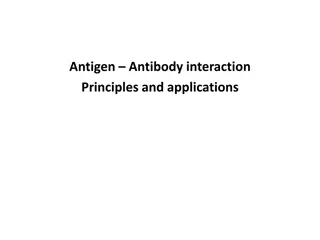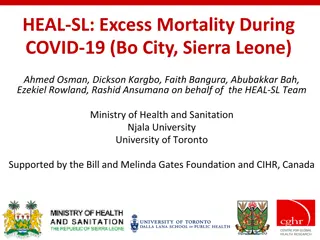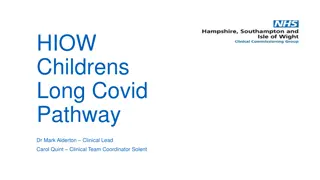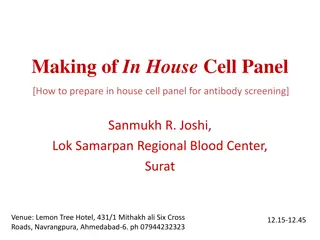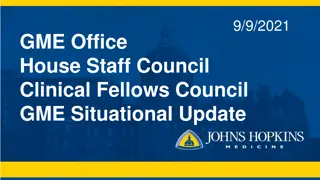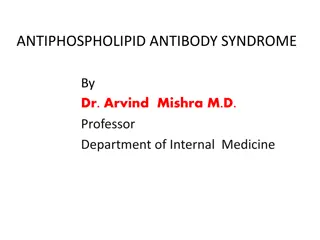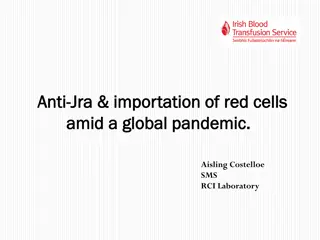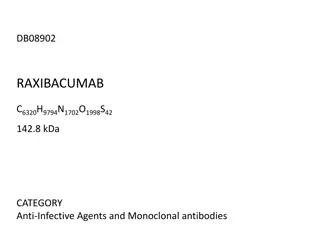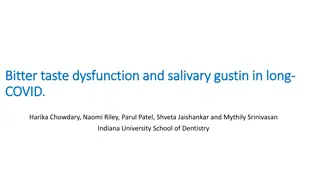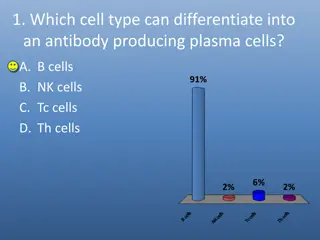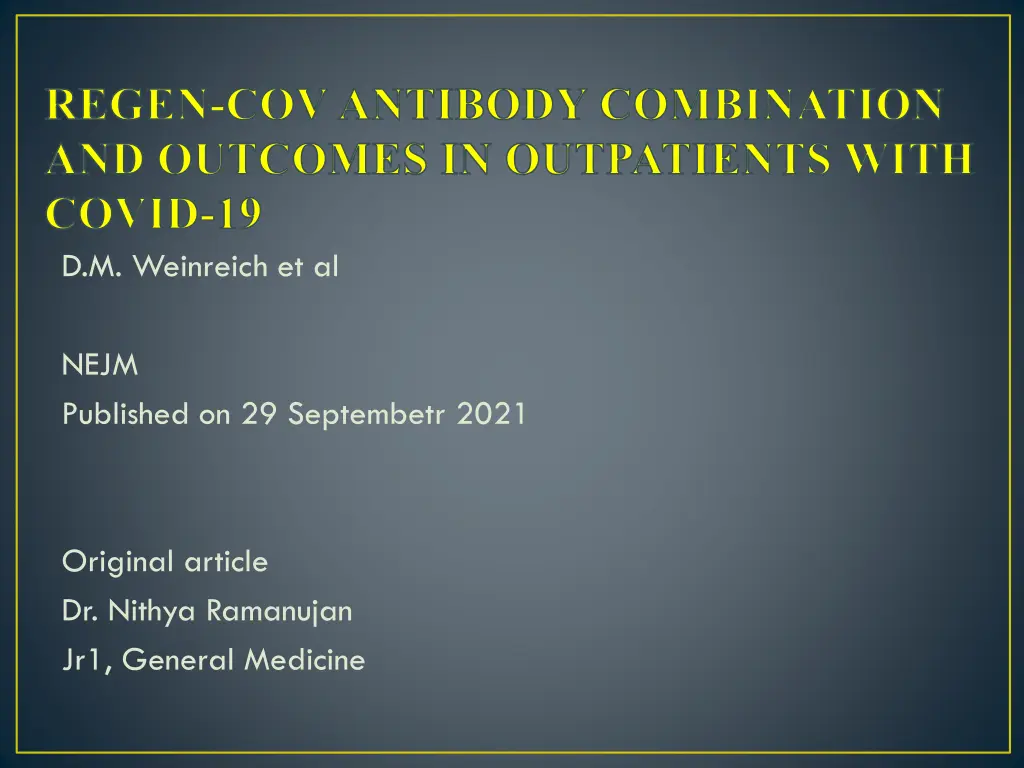
Novel Antibody Combination for Outpatients with COVID-19
Learn about a groundbreaking study on the efficacy of REGEN-COV antibody combination in outpatients with COVID-19, highlighting the potential to reduce hospitalizations and mortality. The research delves into the development, trial design, and outcomes of this promising therapeutic approach, offering insights into combating emerging SARS-CoV-2 variants. Dive into the latest findings published in the NEJM.
Download Presentation

Please find below an Image/Link to download the presentation.
The content on the website is provided AS IS for your information and personal use only. It may not be sold, licensed, or shared on other websites without obtaining consent from the author. If you encounter any issues during the download, it is possible that the publisher has removed the file from their server.
You are allowed to download the files provided on this website for personal or commercial use, subject to the condition that they are used lawfully. All files are the property of their respective owners.
The content on the website is provided AS IS for your information and personal use only. It may not be sold, licensed, or shared on other websites without obtaining consent from the author.
E N D
Presentation Transcript
REGEN-COV ANTIBODY COMBINATION AND OUTCOMES IN OUTPATIENTS WITH COVID-19 D.M. Weinreich et al NEJM Published on 29 Septembetr 2021 Original article Dr. Nithya Ramanujan Jr1, General Medicine
INTRODUCTION Severe acute respiratory syndrome coronavirus 2 (SARS-CoV-2) causes coronavirus disease 2019 (Covid-19), and as of September 2021, it has infected more than 230 million people and led to approximately 4.7 million deaths globally. Although most patients with Covid-19 receive care in the outpatient setting, some have disease that progresses to severe illness leading to hospitalization or death. Several investigational therapeutic agents, including REGEN-COV (previously known as REGN-COV2), are available under emergency use authorization. However, there have been limited clinical data to support their wider use and no approved treatments to reduce the risk of hospitalization or death among patients with mild-to-moderate Covid-19. There is also a need for therapeutic agents that remain effective against emerging SARS-CoV-2 variants of concern, which contain mutations that attenuate immunity resulting from previous SARS-CoV- 2 infection, vaccination, and some monoclonal antibodies
To develop a therapeutic agent that would retain activity against emerging variants, highthroughput screening was undertaken to generate an antibody cocktail consisting of two SARS-CoV-2 neutralizing antibodies against distinct, nonoverlapping epitopes on the spike protein. In vitro studies showed that this antibody cocktail, REGEN-COV, retains activity against current variants of concern and variants of interest, including B.1.1.7 (or alpha), B.1.429 (or epsilon), B.1.617.2 (or delta), and E484K-containing variants such as B.1.351 (or beta), P.1 (or gamma), and B.1.526 (or iota). In the phase 1 2 portion of this phase 1 3 adaptive, multicenter, double-blind, randomized, placebo-controlled trial, REGEN-COV was efficacious in symptomatic outpatients, in whom it reduced the SARS-CoV-2 viral load and the need for medical attention related to Covid-19. Here, we report the results of the primary analysis of the phase 3 portion of this trial.
TRIAL DESIGN AND OVERSIGHT Phase 3 portion of the trial involving outpatients with Covid-19 a) cohort 1-patients who were 18 years of age b) cohort 2 -those who were <18 years of age c) cohort 3 -those who were pregnant at randomization. Initially, the patients were randomly assigned in a 1:1:1 ratio to receive intravenous REGEN-COV at a dose of 2400 mg (1200 mg each of casirivimab and imdevimab) or 8000 mg (4000 mg of each antibody) or intravenous placebo. Results of the phase 1 2 portion of the trial, showed that the 2400-mg and 8000- mg doses had similar antiviral and clinical efficacy and that most clinical events occurred in high-risk patients. Hence the trial was amended on November 14, 2020, so patients subsequently enrolled had at least one risk factor for severe Covid-19 and were randomly assigned in a 1:1:1 ratio to receive intravenous REGEN-COV at a dose of 1200 mg (600 mg of each antibody) or 2400 mg (1200 mg of each antibody) or intravenous placebo.
On February 25, 2021, on the basis of a recommendation from an independent data and safety monitoring committee, patients were no longer randomly assigned to receive placebo. The phase 3 primary efficacy analysis presented here involved cohort 1 patients who were assigned to receive either 2400 mg or 1200 mg of REGEN-COV, with their concurrent placebo groups serving as a control. The trial involving cohorts 2 and 3 is ongoing.
Patients Eligible patients in cohort 1 were 18 years of age or older and were not hospitalized. Confirmed local SARS-CoV-2 positive diagnostic test result within 72 hours before randomization, with the onset of any Covid-19 symptom within 7 days before randomization. All the patients were assessed at baseline for anti SARS-CoV-2 antibodies - anti-spike (S1) IgA, anti-spike (S1) IgG, and anti- nucleocapsid IgG . Then categorized for the analyses as serum antibody negative (if all available test results were negative), serum antibody positive (if any available test result was positive), or other (inconclusive or unknown results).
INCLUSION CRFITERIA 1.Male or female 18 years of age at randomization 2. Has laboratory-confirmed SARS-CoV-2 infection (positive RT-PCR test) 72 hours of randomization 3. Is experiencing >1 of the following symptoms at randomization: fever, cough, shortness of breath 4. Has experienced COVID-19 symptoms for <7 days 5. Maintains O2 saturation 93% on room air 6. Willing and able to provide informed consent 7. Is willing and able to comply with study procedures, including providing samples for viral shedding testing after discharge
EXCLUSION CRITERIA 1. Has been admitted to a hospital prior to randomization, or is hospitalized (inpatient) at randomization, due to COVID-19 2. Has participated, or is participating, in a clinical research study evaluating COVID-1 convalescent plasma, monoclonal antibodies against SARS-CoV-2, or intravenous immunoglobulin (IVIG) within 3 months or less than 5 half-lives of the investigational product (whichever is longer) prior to the screening visit 3. Has a history of COVID-19 investigational or Emergency Use Authorization (EUA)- approved treatments in the past 30 days or less than 5 half-lives of the investigational product (whichever is longer) prior to the screening visit (remdesivir, hydroxychloroquine, tocilizumab, sarilumab, and other immunomodulatory agents) 4. Current use of any COVID-19 investigational or EUA-approved treatment 5. Requires IVIG for medical condition other than COVID-19 6. Has known allergy or hypersensitivity to components of study drug 7. Has been discharged, or is planned to be discharged, to a quarantine center 8. Pregnant or breastfeeding women
INTERVENTION AND ASSESSMENTS At baseline (day 1), REGEN-COV (diluted in normal saline solution) or saline placebo was administered intravenously. The solutions were indistinguishable. Hospitalizations were assessed to be related to Covid-19 by the investigator. The 23-item Symptoms Evolution of COVID-19 instrument, an electronic diary, was used to assess Covid-19 symptoms daily.(feverish, chills, sore throat, cough, shortness of breath or difficulty breathing, nausea, vomiting, diarrhea, headache, red or watery eyes, body aches, loss of taste or smell, fatigue, loss of appetite, confusion, dizziness, pressure or tight chest, chest pain, stomach ache, rash, sneezing, sputum or phlegm, runny nose). Quantitative virologic analysis of nasopharyngeal swab samples and serum antibody testing were conducted in a central laboratory.
ENT POINTS The primary end point -percentage of patients with at least one Covid-19 related hospitalization or death from any cause through day 29. The key secondary clinical end points -percentage of patients with at least one Covid-19 related hospitalization or death from any cause from day 4 through day 29 and the time to resolution of Covid-19 symptoms. Data on targeted adverse events were collected in this trial. The safety end points consisted of serious adverse events and adverse events of special interest (i.e., hypersensitivity events of grade2 or higher, infusion-related reactions, and adverse events for which medical attention at a health care facility was warranted).
RESULTS TRIAL POPULATION Initially, in the original phase 3 portion of the trial, 3088 patients, with or without risk factors for severe Covid-19,were randomly assigned to receive a single intravenous dose of REGEN-COV (8000 mg or 2400 mg) or placebo. In the amended phase 3 portion of the trial, an additional 2519 patients with at least one risk factor for severe Covid-19 were randomly assigned to receive a single dose of REGEN- COV (2400 mg or 1200 mg) or placebo. The median follow-up was 45 days, and 96.6% of the patients had more than 28 days of follow-up.
The primary efficacy population included patients with at least one risk factor for severe Covid-19 and a test for SARS-CoV-2 confirmed at a central laboratory to be positive at baseline. Among the 4057 patients in the modified full analysis set, demographic and baseline medical characteristics were balanced between the REGEN- COV and placebo groups. In the overall modified full analysis set, the median age was 50 years (interquartile range, 38 to 59), 14% were at least 65 years of age, 49% were men, and 35% were Hispanic. The most common risk factors were obesity (in 58%), age of 50 years or older (52%), and cardiovascular disease (36%). A total of 3% of the patients were immunocompromised. The median viral load on nasopharyngeal RT-PCR was 6.98 log10 copies per milliliter (range,5.45 to 7.85), and the majority of patients (69%) were SARS-CoV-2 serum antibody negative at baseline; the high median viral load and the lack of an endogenous immune response at baseline suggested that enrolled patients were in the early phase of infection.
At randomization, the patients reported that they had had Covid-19 symptoms for a median of 3 days (interquartile range, 2 to 5). The nasopharyngeal viral load, serum antibody negative status, and median duration of Covid-19 symptoms at randomization were similar across the trial groups. NATURAL HISTORY OF COVID-19 IN OUTPATIENTS Among the patients who received placebo, there was an association between the baseline viral load and Covid-19 related hospitalization or death from any cause. A total of 55 of 876 patients (6.3%) with a high baseline viral load (>106 copies per milliliter) were hospitalized or died, as compared with 6 of 457 patients (1.3%) with a lower viral load ( 106 copies per milliliter). Patients in the placebo group who were serum antibody negative at baseline had higher median viral loads at baseline than those who were serum antibody positive. It also took longer for the viral levels in patients in the placebo group who were serum antibody negative at baseline to fall below the lower limit of quantification
The serum antibodypositive status did not have a predictive value with respect to the reduction in the incidences of hospitalization or death suggests that some patients had an ineffective immune response. For example, patients in the placebo group who were serum antibody positive but still had disease progression leading to hospitalization or death had high viral loads at baseline and day 7, similar to those in the placebo group who were serum antibody negative and were hospitalized or died.
EFFICACY Primary End Point Covid-19 related hospitalization or death from any cause occurred in 18 of 1355 patients in the REGEN-COV 2400-mg group (1.3%) and in 62 of 1341 patients in the placebo group(4.6%)- (relative risk reduction 71.3%) These outcomes occurred in 7 of 736 patients in the REGEN-COV 1200-mg group (1.0%) and in 24 of 748 patients in the placebo group(3.2%) (relative risk reduction, 70.4%) Five deaths occurred during the efficacy assessment period, including one in the REGEN-COV 2400-mg group, one in the REGEN-COV 1200-mg group, and three in the placebo group. REGEN-COV was also associated with decreases in hospitalization for any cause or death from any cause.
KEY SECONDARY END POINTS The percentage of patients with Covid-19 related hospitalization or death from any cause was observed starting approximately 1 to 3 days after the patients received REGEN-COV or placebo. After these first 1 to 3 days, 5 of 1351 patients in the REGEN-COV 2400-mg group (0.4%), 5 of 735 patients in the REGEN-COV 1200-mg group (0.7%), 46 of 1340 patients in the placebo group who underwent randomization concurrently with the REGEN-COV 2400-mg group (3.4%), and 18 of 748 patients in the placebo group who underwent randomization concurrently with the REGEN- COV 1200-mg group (2.4%) had Covid-19 related hospitalization or died. The median time to resolution of Covid-19 symptoms was 4 days shorter in both REGENCOV dose groups than in the placebo groups (10 days vs. 14 days, respectively).
The more rapid resolution of Covid-19 symptoms with either dose of REGEN-COV was evident by day 3. Both REGEN-COV doses were associated with similar improvements in resolution of symptoms across subgroups. OTHER SECONDARY END POINTS AND ADDITIONAL ANALYSES The incidence of Covid-19 related hospitalization was lower among patients who received REGEN-COV than among those who received placebo. Among patients who were hospitalized due to Covid-19, those in the REGEN-COV groups had shorter hospital stays and a lower incidence of admission to an intensive care unit (ICU) than those in the placebo groups. Covid-19 related hospitalization, emergency department visits, or death from any cause through day 29 occurred in fewer patients in the REGEN- COV groups than in the placebo groups. Fewer patients in the REGENCOV groups had worsening Covid-19 leading to any medically attended visit (hospitalization, an emergency department visit, a visit to an urgent care clinic or physician s office, or a telemedicine visit) or death from any cause.
Fewer symptomatic patients without risk factors for severe Covid-19 had at least one Covid-19 related hospitalization or death from any cause in the REGEN-COV groups than in the placebo groups, although there were few hospitalizations or deaths overall. In patients without risk factors, the time to resolution of symptoms was 2 or 3 days shorter in patients who received REGEN-COV than in those who received placebo. These data indicate a potential benefit of REGEN-COV, regardless of the presence or absence of baseline risk factors for severe Covid-19. All REGEN-COV dose levels led to similar and more rapid declines in the viral load than placebo.
SAFETY More patients had serious adverse events in the placebo group (4.0%) than in the three REGENCOV groups (1.1 to 1.7%). More patients had adverse events that resulted in death in the placebo group (5 of 1843 patients [0.3%]) than in the REGEN-COV groups: 1 of 827 patients (0.1%) in the 1200-mg group, 1 of 1849 patients (<0.1%) in the 2400-mg group, and none of the 1012 patients in the 8000-mg group. Most adverse events were consistent with complications of Covid-19, and the majority were not considered by the investigators to be related to the trial drug. Few patients had infusion-related reactions of grade 2 or higher (no patients in the placebo group; 2 patients in the 1200-mg group, 1 patient in the 2400-mg group, and 3 patients in the 8000-mg group) or hypersensitivity reactions (1 patient in the placebo group and 1 patient in the 2400-mg group). A similar safety profile was observed among the REGEN-COV doses, with no discernable imbalance in safety events.
PHARMACOKINETICS The mean concentrations of casirivimab and imdevimab in serum increased in a dose-proportional manner and were consistent with linear pharmacokinetics for the single intravenous doses. At the end of the infusion, the mean ( SD) concentrations of casirivimab and imdevimab in serum were 185 and 192 78.9 mg per liter, respectively, with the REGEN-COV 1200-mg dose and 321 106 mg per liter and 321 liter, respectively, with the REGEN-COV 2400-mg dose. At day 29, the mean concentrations of casirivimab and imdevimab in serum were 46.4 22.5 mg per liter and 38.3 respectively, with the REGEN-COV 1200-mg dose and 73.2 mg per liter and 60 22.9mg per liter, respectively, with the REGEN-COV 2400-mg dose. The mean estimated half-life was 28.8 days for casirivimab and 25.5 days for imdevimab. 74.5 mg per liter 112 mg per 19.6 mg per liter, 27.2
DISCUSSION Previous data from the phase 1 2 portion of this trial showed that in outpatients with Covid-19, REGEN-COV lowered the viral load, reduced the need for medical attention related to Covid-19, and may have reduced the risk of hospitalization. The phase 3 clinical outcomes data presented here are consistent with and strengthen these findings showing that early use of REGENCOV in outpatients with risk factors for severe Covid-19 can lower the risk of hospitalization or death from any cause. Both doses of intravenous REGEN-COV (1200 mg and 2400 mg) led to a reduction in Covid-19 related hospitalization or death from any cause over a period of 28 days after treatment. The small number of deaths limited the ability to assess the effects of REGEN- COV on mortality. In patients who were hospitalized, REGEN-COV led to a shorter duration of hospitalization and a lower incidence of ICU-level care.
In addition, at both doses, REGEN-COV resulted in more rapid resolution of Covid-19 symptoms by a median of 4 days than placebo. Therefore, a single dose of REGEN-COV in outpatients with Covid- 19 has the potential to improve patient outcomes and reduce the health care burden during this pandemic by reducing morbidity, including hospitalizations and ICU level care. Furthermore, REGEN-COV can speed up recovery from Covid-19, which is an additional benefit for patients because there is a growing body of evidence that some patients, including those with mild symptoms, will have a variably prolonged course of recovery. It was previously hypothesized that although host factors play a role in the disease course, the risk of illness and death associated with SARS-CoV-2 infection may be influenced by a higher viral burden, such that early use of an anti-spike monoclonal antibody combination could reduce this risk.
In support of the hypothesis, this trial found that patients in the placebo group who had a Covid-19 related hospitalization or died had higher baseline viral loads and cleared virus more slowly than those in the placebo group who were not hospitalized or did not die. Since a higher baseline viral load is associated with baseline SARS- CoV-2 seronegative status, the effect of baseline serologic status in patients who received placebo was similarly evaluated in this portion of the trial. In the initial analysis involving the first 275 patients in the phase 1 2 portion of the trial, found that among patients who received placebo, those who were serum antibody negative at baseline had a higher incidence of Covid-19 related medically attended visits than those who were serum antibody positive at baseline. In contrast, in this larger phase 3 data set, patients in the placebo group who were serum antibody positive at baseline had a similar incidence of hospitalization or death as those who were serum antibody negative.
This suggest that some serum antibodypositive patients have an ineffective immune response, consistent with the finding that among the patients who received placebo in this trial, those who were serum antibody positive and had a Covid-19 related hospitalization or who died had high baseline viral load levels similar to the levels in those who were serum antibody negative and had these events. This trial showed that REGEN-COV is associated with clinical benefit, regardless of baseline serum antibody status, so that serologic testing at the time of the Covid-19 diagnosis is less critical for making clinical treatment decisions. Both the 1200-mg and 2400-mg doses of REGEN-COV had similar antiviral and clinical efficacy. This suggests that, in this trial, REGEN- COV concentrations were above the minimally effective dose. Both doses reduced viral loads, particularly in patients with higher viral loads, with a faster time to viral clearance than placebo.
Low incidences of serious adverse events, hypersensitivity reactions, and infusion-related reactions were observed. The concentrations of each antibody in serum from the end of infusion through day 29 were well above the predicted neutralization target concentration based on in vitro and preclinical data. The emergence of resistant variants of SARSCoV- 2 during treatment with an antiviral agent or agents or by circulation within the global community will continue to be a challenge in the development of effective Covid-19 therapeutic agents and vaccines. In vitro studies and in vivo animal studies have shown that combinations of noncompeting antibody-based therapeutics, such as REGEN-COV, are able to suppress the emergence of resistant variants.
REGENCOV was also found to protect against the selection of SARS-CoV-2 variants in an analysis of spike protein genetic diversity involving 1000 patients with Covid-19 (either outpatients from this trial or hospitalized patients from a separate trial). The REGEN-COV combination antibody therapy has had efficacy in vitro against currently circulating variants of concern and variants of interest, including B.1.1.7 (alpha), B.1.351 (beta), B.1.617.2 (delta), and P.1 (gamma). The 2400-mg dose of REGEN-COV received an emergency use authorization (EUA) from the Food and Drug Administration in November 2020 for the treatment of high-risk outpatients with mild-to-moderate Covid-19. In June 2021, after this trial showed that the 1200-mg dose provided a similar decrease in the risk of hospitalization or death and a virologic efficacy that was similar to that provided by the 2400-mg dose, the 1200-mg dose received an EUA (replacing the 2400-mg dose).
REGEN-COV has also been included in the National Institutes of Health treatment guidelines for high-risk outpatients with Covid- 19. The data from this phase 3 trial involving outpatients with Covid-19 showed that the 1200-mg dose of REGEN-COV, like the 2400-mg dose, reduced the risk of Covid-19 related hospitalization or death and sped the time to recovery.

